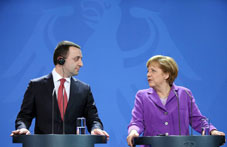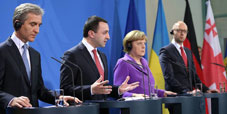
German Chancellor meets the leaders of Georgia, Ukraine and Moldova
By Gvantsa Gabekhadze
Friday, May 30
“We are ready to successfully implement our European Integration priorities in order to build a common future in the European family,” Prime Minister of Georgia Irakli Garibashvili stated on May 29 during a briefing held with the Chancellor of Germany and the Prime Ministers of Moldova and Ukraine.
According to him, Georgia has achieved significant progress in terms of implementation of the perspective opened by the Eastern Partnership.
Garibashvili highlighted that a large number of reforms had been implemented in Georgia as it prepared to sign the association agreement with the European Union next month.
"On June 27 we will sign the association agreement with the European Union, which represents the action plan of our country’s Europeanization,” Garibashvili said.
The Prime Minister stressed that successful relations between Georgia and the EU will greatly depend on the stability of the region.
The German Chancellor, Angela Merkel, stressed that the three Eastern Partnership countries are looking for close and friendly ties with Germany and the EU.
“All three countries have developed a position to participate in the association agreement. Moldova and Georgia have initialed the document, while Ukraine is getting ready to sign it. This agreement provides for democratic national reforms. We hope that all this will be reflected positively in the case of the three countries,” Merkel said, noting that despite some difficulties, all three countries have chosen the path of rapprochement with the EU.
“The European Union always urges Russia to be responsible for its actions,” the Chancellor stated.
Moldova’s PM Yuri Leanca emphasized that Moldova's path towards the EU has already been chosen and there is no controversy over the issue.
"Moldova has fixed its position with respect to European integration. We have a deliberate commitment to this way. We want to establish an independent and functioning country and most importantly, we will sign the association agreement, which will impact the development of our country and I hope that its results will be positive for us,” Leanca said.
“The fact that the German Chancellor has invited the Georgian Prime Minister twice in a short period of time, indicates huge support demonstrated by the German leadership towards Georgia,” said Lado Chanturia, Georgia’s ambassador to Germany.
Analyst Ramaz Sakvarelidze told The Messenger that no one can be sure that Georgia will sign the agreement until it is signed. “However, such meetings and statements and each passed day brings us closer to the agreement,” Sakvarelidze said. The analyst stated that Russia might create some threats to the process, for example if the situation in Abkhazia becomes more strained. “However, it is another issue if it is in Russia’s interests to have another hot point,” Sakvarelidze stated. The analyst emphasized that both the previous and current authorities create exaggerated hopes regarding the agreement, and media also plays a not very positive role in this regard. “The issue is much speculated and talked about, it is becoming boring for public. I am sure that the hopes and outcomes would not coincide after the signing and the misbalance will create dissatisfaction with the public.”


